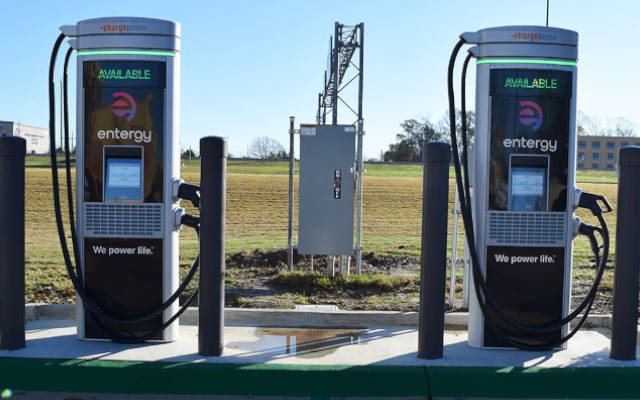MAGAdministration Forced to Resume $5 Billion EV Charger Funding

Entergy DC Fast Charger station opens in Mississippi
By EVWorld Si Editors
A federal court has ordered the Trump administration to resume disbursement of over $4 billion in electric vehicle (EV) charger funding that had been frozen since February. The ruling marks a major victory for 14 states that sued to unblock the National Electric Vehicle Infrastructure (NEVI) program, originally created under the Bipartisan Infrastructure Law of 2021.
Billions Back in Play
The NEVI program was allocated $5 billion to build a nationwide EV charging network. Of that, $4.2 billion had been stalled, with $2.7 billion still unobligated. The court’s decision forces the administration to resume funding, though with significantly loosened rules.
States Most Impacted
The lawsuit was led by a coalition of red and blue states, including:
- Blue/Purple States: California, New York, Arizona
- Red/Purple States: Texas, Georgia, Florida
While blue states had more aggressive EV goals, red states stood to gain from NEVI’s original equity mandates - now removed under revised guidance.
Fast Chargers Still Favored
Despite the rollback of siting and equity requirements, most states continue to prioritize DC Fast Chargers. In Q2 2025, nearly two-thirds of new stations deployed were 250 kW fast chargers. The revised rules eliminate the 50-mile spacing requirement and no longer mandate rural or underserved coverage.
Who Stands to Benefit?
With fewer restrictions and streamlined approvals, large firms are expected to dominate contract awards:
| Company | Why They Benefit |
|---|---|
| Tesla | Expansive Supercharger network and strong federal presence |
| ChargePoint | Leader in public and commercial EV charging |
| EVgo | Specializes in DC Fast Charging with federal experience |
| ABB, Siemens, Schneider Electric | Provide hardware and installation services |
Local contractors may also benefit, though the removal of equity mandates could reduce opportunities for small and minority-owned businesses.
Legal and Political Fallout
The ruling came from the U.S. District Court for the Western District of Washington, based in Seattle. Judge Tana Lin issued the preliminary injunction in June 2025, stating that the administration’s freeze likely violated federal law by overriding congressional appropriations. The order reinstated funding for 14 states, though requests from D.C., Minnesota, and Vermont were denied due to lack of immediate harm.
The injunction is enforceable and backed by the Government Accountability Office. While the administration has complied, critics argue the revised rules undermine the original goals of accessibility and environmental justice.
Articles featured here are generated by supervised Synthetic Intelligence (AKA "Artificial Intelligence").
